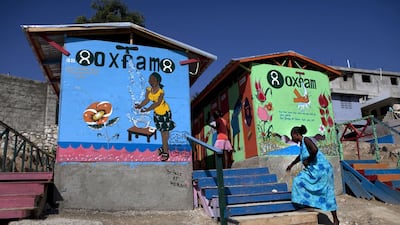A senior executive at the embattled charity Oxfam has resigned over the failure to act on allegations of sexual misconduct against officials working in Haiti following the devastating 2010 earthquake.
Penny Lawrence, the deputy chief executive, said that she felt “ashamed” about what had happened on her watch and took full responsibility for the failure to identify and prevent the use of prostitutes by aid workers.
Four members of Oxfam staff were dismissed and three, including the country director, resigned before the end of an inquiry into claims that charity staff used sex workers in Haiti in 2011. The charity said allegations that underage girls may have been involved were “not proven” but they did not pass allegations to police to investigate further.
The charity has been accused of covering up the scale of wrongdoing with the scandal leading to questions about the effectiveness of the UK’s aid programme.
_______________
Read more:
UK minister warns of funding withdrawal, as Oxfam faces further sexual misconduct allegations
Oxfam denies covering up sex worker scandal in earthquake hit Haiti
_______________
The UK passed a law in 2015 to ringfence 0.7 per cent of GDP on aid spending, a pledge that has been criticised by some legislators from the ruling Conservative party. Oxfam is Britain’s largest international development charity employing some 5,000 people and with annual income of some £408 million, according to its most recently published accounts.
The accounts showed that Ms Lawrence was paid £99,000 in the year to March 2017. She quit after a report in The Times revealed that allegations over the use of sex works had been made against Haiti country director, Belgian Roland van Hauwermeiren, during a previous posting in Chad for Oxfam.
“Over the last few days we have become aware that concerns were raised about the behaviour of staff in Chad as well as Haiti that we failed to adequately act upon,” Ms Lawrence said in a statement.
"As programme director at the time, I am ashamed that this happened on my watch and I take full responsibility. I am desperately sorry for the harm and distress that this has caused to Oxfam's supporters, the wider development sector and most of all the vulnerable people who trusted us.”
International Development Secretary Penny Mordaunt met with Mark Goldring, Chief Executive of Oxfam, and Caroline Thomson, Oxfam Chair of Trustees.
“Oxfam made a full and unqualified apology – to me, and to the people of Britain and Haiti - for the appalling behaviour of some of their staff in Haiti in 2011, and for the wider failings of their organisation’s response to it,” Ms Mordaunt said in a statement.
“They spoke of the deep sense of disgrace and shame that they and their organisation feel about what has happened, and set out the actions they will now take to put things right and prevent such horrific abuses happening in future”.
She confirmed that Oxfam did not inform the Department for International Development at the time that this case involved sexual misconduct or beneficiaries. Ms Mordaunt said Oxfam say they are “cooperating fully” with the authorities in Haiti and will do so in any other country where abuse has been exposed.
Oxfam will be providing full details of those involved in the abuse to the governments of their home countries.
“I told Oxfam they must now demonstrate the moral leadership necessary to address this scandal, rebuild the trust of the British public, their staff and the people they aim to help, and deliver progress on these assurances. It is on the basis of their actions going forward – rather than of their commitments in one meeting today - that I and others will judge them. I was clear that part of an organisation’s moral leadership comes from individuals taking responsibility for their actions,” she said.
Ms Mordaunt also met with the Chief Executive of the Charity Commission for England and Wales, Helen Stephenson, who said the Commission has urgently requested full and frank disclosure of what happened in 2011 from Oxfam and they are considering their next regulatory steps.
DFID have created a new unit to urgently review safeguarding across all parts of the aid sector.
Andrew MacLeod, a former senior UN head of aid operations, said the resignation was “the first act of moral courage we have seen from Oxfam since this has started”.
The episode has pointed to a wider crisis within charity sector with some 1,000 incidents a year reported to the regulator by charities over exploitation issues.
Oxfam, which says that it works in 90 countries including Afghanistan and Iraq, on Sunday announced a package of measures to improve safeguarding, including improved recruitment and vetting and a new whistleblowing helpline.
Oxfam’s chief executive Paul Goldring met with Ms Mordaunt and warned that the charity faces losing £32 million of government funding because of the scandal.
Ms Mordaunt's predecessor Priti Patel told the UN in 2017 that the international system had failed in dealing with the “scourge of child sex abuse and child rape in development and peacekeeping.
She said at the weekend that there was a "culture of denial" about exploitation in the aid sector, but said she was not aware of allegations within Oxfam. The Charity Commission, which regulates the sector, further claimed that it had not been told the full story of the episode, including the possibility that crimes had been committed against children.
Aid campaigners said the scandal at Oxfam should not detract from the work of UK international development charities amid concerns of cuts to the aid budget.
“Don’t damn the whole system because of the bad behaviour and human frailty of a few,” said Andrew Mitchell a lawmaker for the ruling Conservative party.

